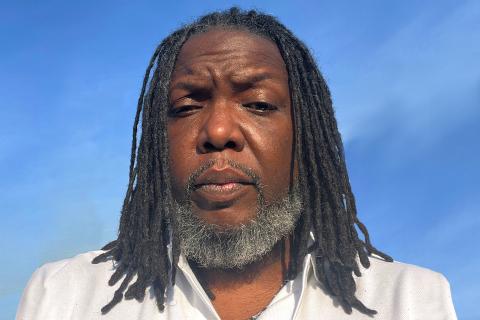
Marshall was on one of his business trips as a global security manager for a large corporation when his ankle began to swell uncomfortably.
“I thought I just needed to rest,” he recalls. But when he got to the airport, his wife, a renal nurse, knew immediately that something was wrong. So much so, that she arranged to see their family doctor on the way home.
When the test information came in that afternoon, the doctor asked them to come into her office. “I remember the look on her face,” says Marshall. “She had this look of concern. I thought, ‘This isn’t good’.” She said, “I’ve got some news, and I don’t really know how to deliver it.” The doctor told Marshall that, based on his bloodwork, his kidneys were failing. He didn’t understand the severity, but as they left the office, his wife started crying.
A few days later, another doctor confirmed the danger, telling Marshall, “You’re in renal failure, stage three. You could fall into a coma at any second.”
Even then, it was hard for Marshall to accept what was happening. “I thought I was just getting older. I thought I’d go get some medication or supplements and it would fix me.” But another nephrologist confirmed the diagnosis, and helped Marshall understand that time was of the essence. “I went on the waiting list for a kidney transplant,” says Marshall, “and I started my life on dialysis.”
Marshall stayed on peritoneal dialysis for a year and a half, but his health and strength declined. He didn’t like living by mechanical means, and it was taking an emotional toll. “I was alive, but I wasn’t living,” he says. When he was told that peritoneal dialysis was no longer sustainable, Marshall decided he would forego treatment. This seemed like a bridge too far. He began making plans for not being around much longer.
During this time, Marshall put out an ad to have someone come move some heavy TVs in his house. The person who answered the ad was named Brian. At first, Marshall thought he introduced himself as Brian “Angel” – because that’s who he turned out to be.
Once the TVs were moved, Brian gave Marshall his driver’s license to make sure he spelled his name right on his check. Marshall noticed that Brian was registered as an organ donor, and said jokingly, “Hey, do you want to give up a kidney?” Brian laughed it off, asked a few questions, like Marshall’s blood type, and the two chatted some more before he left.
Two hours later, Brian called back. He said, “I just spoke with my son, and my blood type is the same as yours.” Then he said the magic words. “I’d like to get tested for you.”
Marshall just thought Brian was trying to be nice. But Brian called a transplant coordinator and started the process. Finally, the tests came back; Brian was almost a perfect genetic match. “I think I just broke down in tears…I was overwhelmed,” says Marshall.
The transplant surgery was scheduled right before Thanksgiving. Marshall was torn between hope, disbelief, worry, and gratitude. “I kept asking myself how someone who doesn’t even know me could become an altruistic donor?”
The morning of the surgery came, and the two men met at the hospital. They were put on their gurneys, went their separate ways, and the next thing Marshall remembers was simply waking up. He wondered if the surgery had actually happened. “Oh, no, you’re all done,” a nurse told him. “You did exceptionally.” Later, Brian came over and joked with Marshall. The doctor told them both it was hard to find a better match.
The two men have stayed in touch in the fourteen years since the transplant took place – both in good health. In that time, Marshall’s son was born, and his father tells him that it’s thanks to Brian that he’s here on earth. Marshall has also signed up to be an organ donor – another way to pass blessings along.
Looking back, Marshall believes that the key to understanding living donation is getting the stories out there, like his – that it’s possible to donate an organ like a kidney, be healthy, and change, or even save, someone’s life.
“People take life for granted,” he says. “But it is so precious. I came very close to not being here. And when you start to think of that finality, you really start to appreciate what you have – or what you have left.”
“I'm thankful to be here one more day. And I try to do things that can be a blessing for others. Because of Brian’s donation, I can do that. It gave me a future. It gave me life.”
Learn more about living organ donation and the lives it can save.